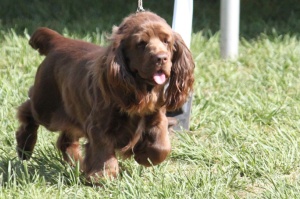We recently lost one of our dogs. We were walking them in local woods when Hamish caught a scent of something irresistible and off he went. After an hour of calling him we reluctantly came home. A second trip was no more successful and we again came home, since night was coming. The house felt very empty, despite our other dog. In the morning we were told that Hamish had been found and was safely ensconced with a local dog warden. We couldn’t understand why we hadn’t been contacted directly since he had a name tag and contact number. Unfortunately this had come off and we hadn’t realised it. (He now has a new one, securely attached.) He came home none the worse for his night out.
His absence was palpable, even though we have two dogs. He brings an energy to the place-even when he’s asleep.The playwright Tom Stoppard has the line “Death is the absence of presence” in Rosencrantz and Guildenstern. That was how we felt that night. There had been a death and there was now an absence . Happily it was short-lived absence. I began to think about how this absence due to something lost is often played out in clinical work. Many of my patients come with lost objects. Sometimes living. Sometimes dead. But absent for whatever reason. And this absence always feels like a death. Part of my work as a counsellor is to help my patents find those objects that they have lost. “Lost” here having many meanings. Lost as in misplaced. Lost as in deliberately hidden. Lost as in denied. The effect is the same. Death and the absence of presence. This is not easy work for either of us .It is often painful -although one hopes it is ultimately healing. The discovery of something previously lost is not always a joyful reunion and as a therapist one is not always loved for pointing out the absence. We do the work out of a belief that if something is present, it can be thought about and known. (This may lead to a good death and a proper burial. Or to an incorporating this new object into oneself.)
When I was first thinking of this blog, I intended to end it on that last paragraph. That would have made a neat ending and another “successful” blog. But a friend challenged me recently about my own lost objects- or those objects that I have temporarily disowned. As therapists we spend a lot of time helping our patients find their own lost objects. This can be a way of denying our own vulnerability. We sit quietly in our therapist chair and comment on what we think is happening. We claim therapeutic immunity from being asked about our lives. Our task, we say primly, is to help you, the patient .We understand your interest but will not satisfy it for you. (Or a variation on that theme.) There is truth and value in this reply. We are there to help our patients who won’t be helped by hearing about my divorce or my car crash etc. The danger comes when we try to apply therapeutic immunity to ourselves.
As therapists we are as vulnerable as our patients. We know about hurt, loss, grief, rage etc. As well as about joy, pleasure, delight, longing etc. The danger for us is to deny these feelings- particularly those that challenge us and threaten to overwhelm us. Here is where we need friends, partners and the like to remind us of our lost objects and to help us bring them back into consciousness. Mercifully, we are not omnipotent. Much as though it is a fantasy in which we sometimes indulge!